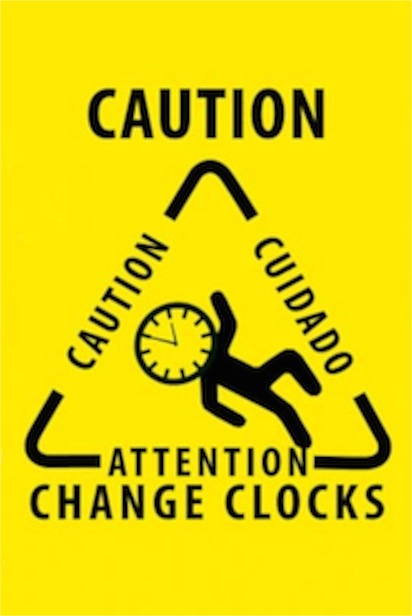Savings
03/11/13 04:46

That is a joke that I have made at this time of year for several years. It wouldn’t surprise me if you have read it in my blog.
The transition from Daylight Savings Time has gone well for us. We have just a few clocks to set in our home. The computers and cell phones set themselves automatically. We have one clock that we have never figured out how to set, so we change the time zone on that clock for Daylight Savings Time. Now we can go back to our own time zone on the clock, not that it matters or that anyone notices.
I heard that there are so many clocks and watches at The Clock Shop in downtown Rapid City that they start setting clocks a week early and it takes the whole week to get all of the clocks set. They have several antique clocks there. I’m sure that there are plenty of clocks that cannot be moved backward. So to “fall back” you have to move the clock ahead 11 hours. We have one clock in the church that is a mechanical 7-day clock. The clock controls the ringing of our bell. It cannot be turned back. So, rather than turn it six days and 23 hours ahead, I stop it by tripping the breaker in the basement. Then an hour later, I re-start the clock and adjust the time. Not much work, really.
Since I have my old joke, the change to or from Daylight Savings Time gets me to thinking about the practice of paying and earning interest. Since the financial crisis of 2008, interest rates have remained very low in the United States. It is hard to earn much interest at all on invested money. CD rates remain below 2%, which means that money invested in a CD probably loses a bit of purchasing power over time.
There is still plenty of money to be made by charging interest, however, Banks basically operate on a margin. They lend money at a higher interest rate than they pay on savings. The difference is their profit. There is nothing wrong with profit. However, our economic system in the United States is based on a system of credit ratings that generally result in credit being available only to middle and upper class residents. Those with less income tend to be seen as less credit worthy. The result is that there is a non-bank system of lenders from pawn shops, payday lenders and title loan companies that in general charge very high rates of interest. Those who can least afford to pay interest end up paying the most. Those who can afford generally don’t have to pay much interest.
The system runs contrary to Biblical principles.
The Bible is very clear in its prohibitions agains charging interest from poor people.
But I have heard plenty of folks who say that the economy simply wouldn’t work without interest. And there is a common belief that the price of credit is a simple product of the market. The risks associated with lending money to poor people are higher and therefore the cost needs to be higher.
Then there are the “bait and switch” schemes that are a part of the money lending business. There is a local business that routinely advertises, “no money down, no interest if paid in full by the deadline.” It sounds like a good deal. But if you read the fine print on the contract, which people rarely do, you will find out that if the loan isn’t paid in full by the deadline, the interest applies to the full amount, not just to the unpaid balance. By the terms of the contract, a borrower could borrow a thousand dollars, pay back $999 by the deadline and end up owing 21% interest on the full $1,000.
However, it is possible for an economy to operate without interest. Just like Daylight Savings time where an hour in is an hour out, a cash economy can operate with everything having a face value. Back in the 1960’s Koinonia Farm operated without interest. From that venture, Habitat for Humanity was formed. Habitat for Humanity operates without interest. They don’t borrow, so there is no interest paid and they don’t charge interest, so homeowners pay only the actual cost of their home. Habitat for Humanity also doesn’t make a profit.
Skeptics said that it wouldn't work. You can’t operate with no interest and no profit. But Habitat for Humanity works just fine even in the midst of a dominant economy where interest is charged and profits are made. Habitat for Humanity is one of the largest mortgage lenders in the world. And Habitat for Humanity weathered the mortgage crisis without a crisis. Their borrowers weren’t over extended. The default rate for Habitat for Humanity mortgages is very low because care is taken to keep costs low and match them to both the needs of the homeowners and their ability to pay.
An economy without interest bases value on services rendered and work performed instead of artificial markets. It is simple, direct, and less prone to the dramatic fluctuations which are generally a part of the market.
Money itself is simply an idea that people agree to treat as if it were a real commodity. Our common agreement gives money its value. There is nothing inherent in the nature of money that says it has to multiply or somehow become worth more just because it is not spent. An economy that expects people to be paid simply for having money works to make the rich richer and the poor poorer. There are alternatives to the way that we do things.
I don’t expect the economy to suddenly be transformed. But perhaps if we think about money as we think about time we might make different decisions. After all both are things of which we have a limited quantity.